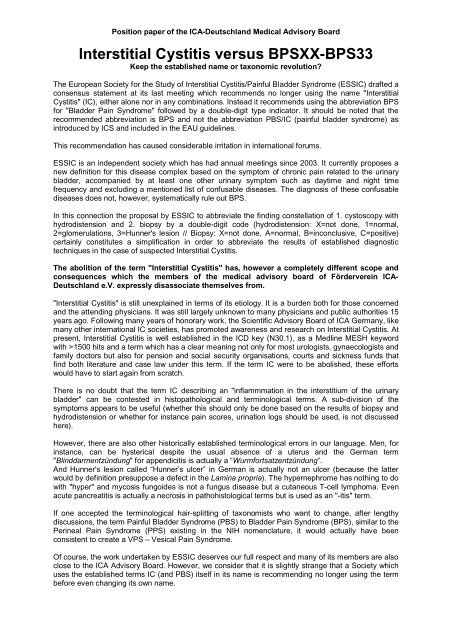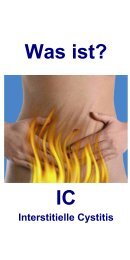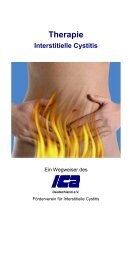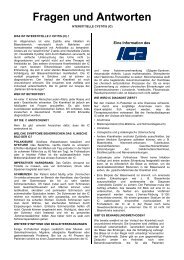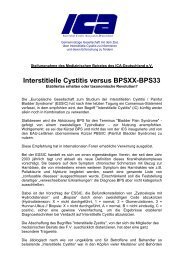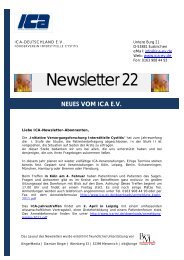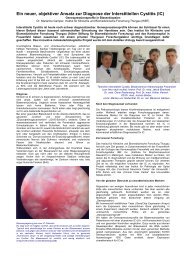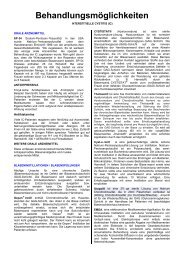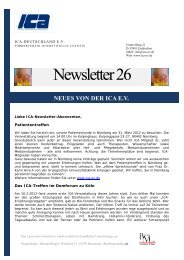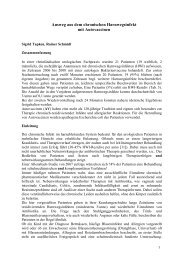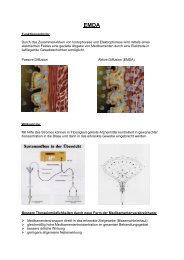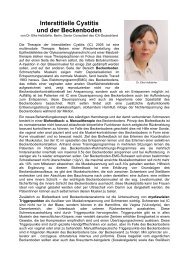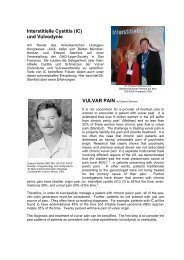Interstitial Cystitis versus BPSXX-BPS33 - ICA-Deutschland e.V.
Interstitial Cystitis versus BPSXX-BPS33 - ICA-Deutschland e.V.
Interstitial Cystitis versus BPSXX-BPS33 - ICA-Deutschland e.V.
Create successful ePaper yourself
Turn your PDF publications into a flip-book with our unique Google optimized e-Paper software.
Position paper of the <strong>ICA</strong>-<strong>Deutschland</strong> Medical Advisory Board<br />
<strong>Interstitial</strong> <strong>Cystitis</strong> <strong>versus</strong> <strong>BPSXX</strong>-<strong>BPS33</strong><br />
Keep the established name or taxonomic revolution?<br />
The European Society for the Study of <strong>Interstitial</strong> <strong>Cystitis</strong>/Painful Bladder Syndrome (ESSIC) drafted a<br />
consensus statement at its last meeting which recommends no longer using the name "<strong>Interstitial</strong><br />
<strong>Cystitis</strong>" (IC), either alone nor in any combinations. Instead it recommends using the abbreviation BPS<br />
for "Bladder Pain Syndrome" followed by a double-digit type indicator. It should be noted that the<br />
recommended abbreviation is BPS and not the abbreviation PBS/IC (painful bladder syndrome) as<br />
introduced by ICS and included in the EAU guidelines.<br />
This recommendation has caused considerable irritation in international forums.<br />
ESSIC is an independent society which has had annual meetings since 2003. It currently proposes a<br />
new definition for this disease complex based on the symptom of chronic pain related to the urinary<br />
bladder, accompanied by at least one other urinary symptom such as daytime and night time<br />
frequency and excluding a mentioned list of confusable diseases. The diagnosis of these confusable<br />
diseases does not, however, systematically rule out BPS.<br />
In this connection the proposal by ESSIC to abbreviate the finding constellation of 1. cystoscopy with<br />
hydrodistension and 2. biopsy by a double-digit code (hydrodistension: X=not done, 1=normal,<br />
2=glomerulations, 3=Hunner's lesion // Biopsy: X=not done, A=normal, B=inconclusive, C=positive)<br />
certainly constitutes a simplification in order to abbreviate the results of established diagnostic<br />
techniques in the case of suspected <strong>Interstitial</strong> <strong>Cystitis</strong>.<br />
The abolition of the term "<strong>Interstitial</strong> <strong>Cystitis</strong>" has, however a completely different scope and<br />
consequences which the members of the medical advisory board of Förderverein <strong>ICA</strong>-<br />
<strong>Deutschland</strong> e.V. expressly disassociate themselves from.<br />
"<strong>Interstitial</strong> <strong>Cystitis</strong>" is still unexplained in terms of its etiology. It is a burden both for those concerned<br />
and the attending physicians. It was still largely unknown to many physicians and public authorities 15<br />
years ago. Following many years of honorary work, the Scientific Advisory Board of <strong>ICA</strong> Germany, like<br />
many other international IC societies, has promoted awareness and research on <strong>Interstitial</strong> <strong>Cystitis</strong>. At<br />
present, <strong>Interstitial</strong> <strong>Cystitis</strong> is well established in the ICD key (N30.1), as a Medline MESH keyword<br />
with >1500 hits and a term which has a clear meaning not only for most urologists, gynaecologists and<br />
family doctors but also for pension and social security organisations, courts and sickness funds that<br />
find both literature and case law under this term. If the term IC were to be abolished, these efforts<br />
would have to start again from scratch.<br />
There is no doubt that the term IC describing an "inflammmation in the interstitium of the urinary<br />
bladder" can be contested in histopathological and terminological terms. A sub-division of the<br />
symptoms appears to be useful (whether this should only be done based on the results of biopsy and<br />
hydrodistension or whether for instance pain scores, urination logs should be used, is not discussed<br />
here).<br />
However, there are also other historically established terminological errors in our language. Men, for<br />
instance, can be hysterical despite the usual absence of a uterus and the German term<br />
"Blinddarmentzündung" for appendicitis is actually a “Wurmfortsatzentzündung”.<br />
And Hunner's lesion called “Hunner’s ulcer” in German is actually not an ulcer (because the latter<br />
would by definition presuppose a defect in the Lamina propria). The hypernephrome has nothing to do<br />
with "hyper" and mycosis fungoides is not a fungus disease but a cutaneous T-cell lymphoma. Even<br />
acute pancreatitis is actually a necrosis in pathohistological terms but is used as an "-itis" term.<br />
If one accepted the terminological hair-splitting of taxonomists who want to change, after lengthy<br />
discussions, the term Painful Bladder Syndrome (PBS) to Bladder Pain Syndrome (BPS), similar to the<br />
Perineal Pain Syndrome (PPS) existing in the NIH nomenclature, it would actually have been<br />
consistent to create a VPS – Vesical Pain Syndrome.<br />
Of course, the work undertaken by ESSIC deserves our full respect and many of its members are also<br />
close to the <strong>ICA</strong> Advisory Board. However, we consider that it is slightly strange that a Society which<br />
uses the established terms IC (and PBS) itself in its name is recommending no longer using the term<br />
before even changing its own name.
Whether we really do our patients a favour with the diagnosis of for instance a "bladder pain syndrome<br />
X3" is at least in doubt. We should not suggest to our patients that the disease which they may have<br />
been suffering from for several years, no longer exists according to the current terminology.<br />
Maybe it is the phenomenon of the German spelling reform chaos (which may be seen as a piece of<br />
bungling by certain publishers of school books) that suggests that new spellings for old terms are<br />
progress in themselves. In the current hype for new designations we should actually focus on the<br />
essentials.<br />
That means advancing etiology and sound therapeutic studies with a high evidence level, representing<br />
the knowledge available on <strong>Interstitial</strong> <strong>Cystitis</strong> in a neutral and unbiased manner and - pending the<br />
availability of better findings - acting as a serious advocate of patients.<br />
Against the backdrop of this argumentation, a survey amongst the Working Group Infectiology of DGU<br />
(German Society for Urology) revealed that an overwhelming majority of its members are in favour of<br />
maintaining the term IC in the nomenclature.<br />
Since new definitions without new etiological findings do not justify a new designation of IC, the<br />
Scientific Advisory Board of <strong>ICA</strong> unanimously decided at its meeting on January 19, 2007 to continue<br />
to use the term "IC" and we call on everybody else to proceed in this manner. At the 59th Congress of<br />
our expert society we are looking forward to a forum on "<strong>Interstitial</strong> <strong>Cystitis</strong>".<br />
A new coinage for "<strong>Interstitial</strong> <strong>Cystitis</strong>" should be reserved for the day on which the underlying causes<br />
of this disease have at last have been clarified.<br />
1. Oberpenning, Frank Chief of Staff of the Clinic for Urology and Child Urology, St.-Agnes-<br />
Hospital Bocholt, Barloer Weg 125, 46397 Bocholt, Telephone:0 28 71 / 20 29 31,Telefax:0 28<br />
71 / 20 29 32, E-Mail: f.oberpenning@st-agnes-bocholt.de<br />
2. Ragi Doggweiler, MD, Ass. Prof, Dep. of Urology University of Tennessee Knoxville, USA<br />
rdoggweiler@yahoo.com<br />
3. Jocham, Dieter, Director of the Clinic and Policlinic for Urology of the University Clinic<br />
Schleswig-Holstein, Ratzeburger Allee 160, 23538 Lübeck, Tel.: +49-451-500-2271, Fax: +49-<br />
451-500-3338, Email: Prof.Jocham.MUL@t-online.de<br />
4. Loch, Annemie, Gynaecological Clinic of the Diaconesse Clinic, Teaching Hospital of the<br />
University of Schleswig-Holstein, Marienhölzungsweg 2, 24939 Flensburg, Telephone: +49<br />
461-812-1405 /1401, E-Mail: lochan@diako.de<br />
5. Roth, Stefan, Director of the Urology Clinic, Helios Kliniken Wuppertal GmbH, Heusnerstraße<br />
40, D-42283 Wuppertal, Tel.: +49 2 02 8 96 - 34 09, Fax: 0202-896-3408, E-Mail:<br />
sroth@wuppertal.helios-kliniken.de<br />
6. Schultz-Lampel, Daniela, Director of the Continence Centre Southwest at Schwarzwald-Baar<br />
Klinikum in Villingen-Schwenningen, Gebäude K, Röntgenstr. 20,78054 Villingen-<br />
Schwenningen, Telephone: 07720 / 93-0, Telefax: 07720 / 93-2498, E-Mail: ksw@sbk-vs.de<br />
7. Stoerkel, Stefan, Director of the Institute for Pathology, Helios-Kliniken Wuppertal GmbH,<br />
Heusnerstraße 40, 42283 Wuppertal, Telephone: +49 2 02 8 96 - 28 50, Fax +49 2 02 8 96 –<br />
2739, E-Mail: sstoerkel@wuppertal.helios-kliniken.de<br />
8. Stratmeyer, Rudolf, Head of the Urology Department, Specialist Clinic Rodenkirchen,<br />
Schillingsrotter Str. 39-45, 50996 Köln/Rodenkirchen, Telephone:0221-9352925, Fax:0221-<br />
9352927, E-Mail: Stratmeyer@t-online.de<br />
9. Thueroff, Joachim W., Director of the Urology Clinic and Policlinic of the Johannes Gutenberg<br />
University, Langenbeckstr. 1, D-55101 Mainz, Tel.: 06131-177183, Fax: 06131-232986,Email:<br />
Thueroff@urologie.klinik.uni-mainz.de<br />
10. Vahlensieck, Winfried, Chief of Staff of the Urology Department of Clinic Wildetal,<br />
Mühlenstraße 8, 34537 Bad Wildungen, Telephone:05621-881032 , Fax:05621-881010, E-<br />
Mail: Winfried.Vahlensieck@t-online.de<br />
11. Van Ahlen, Hermann, Chief of Staff of the Urology Clinic of the Municipal Clinics, Am<br />
Finkenhügel 1, D-49076 Osnabrück, Tel.: 0541-405 8001, Fax: 0541-405-8099, E-mail:<br />
vanAhlen@t-online.de<br />
12. Woerdehoff, Alois. Practice Clinic, Ursulinenstr. 39, 53879 Euskirchen, Telephone:02251-<br />
770077, Fax: 02251- 770078, E-Mail: AWOER@t-online.de<br />
13. Hertle, Lothar, Director of the Clinic and Policlinic for Urology, University Clinic Münster,<br />
Albert-Schweitzer-Str. 33,48149 Münster, Tel: 0251-8347442, Fax: 0251-8349739, E-Mail:<br />
prof.hertle@uni-muenster.de


